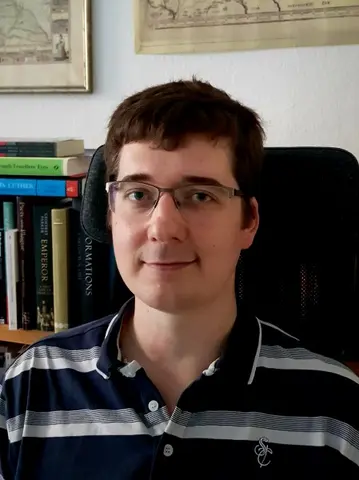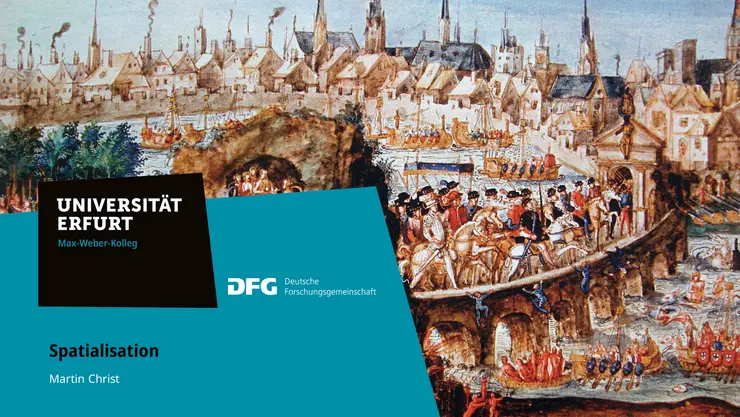Dr. Martin Christ
martin.christ@uni-erfurt.deJunior Fellow (Max-Weber-Kolleg für kultur- und sozialwissenschaftliche Studien)
Sprechzeiten
nach Vereinbarung
Besucheranschrift
Max-Weber-Kolleg für kultur- und sozialwissenschaftliche Studien
Campus
Nordhäuser Str. 63
99089 Erfurt
Postanschrift
Universität Erfurt
Max-Weber-Kolleg für kultur- und sozialwissenschaftliche Studien
Postfach 90 02 21
99105 Erfurt

Aktuelles
Sektionsleitung Deutscher Historikertag 2023 in Leipzig: "City Branding: Urbanity and the Construction of City Images in Europe and South Asia", zusammen mit Susanne Rau & Sara Keller
Neuer Aufsatz: ‘The London Bills of Mortality. State of the Art and Future Directions of Research’, Bulletin of the German Historical Institute (2023), pp. 39–75.
Video: Vortrag zu 'Spatialisation' auf der 2022 Jahreskonferenz der KFG "Religion and Urbanity" (FOR 2779)
Zur Person
- 10/2022-04/2023 Elternzeit (50%)
- Seit 10/2018 wissenschaftlicher Mitarbeiter (Habilitand), Max-Weber-Kolleg
- 10/2017-09/2018 Teach@Tübingen Fellow, Universität Tübingen
- 10/2013-09/2017 Promotion (Vollstipendium des Arts and Humanities Research Councils), University of Oxford, Betreurin: Prof. Dr. Lyndal Roper, Thema: Biographies of a Reformation: Religious Change and Confessional Coexistence in Upper Lusatia, c. 1520-1635
- 10/2014-09/2015 Gastdoktorand an der Technischen Universität Dresden, Betreuer: Prof. Dr. Gerd Schwerhoff (finanziert durch die Alexander von Humboldt Stiftung)
- 10/2012-09/2013 Master of Letters in Reformationsgeschichte (Distinction), St. Andrews, Betreuerin: Prof. Dr. Bridget Heal
- 10/2009-09/2012 Bachelor of Arts (First Class Honours), University of Warwick
Forschungsschwerpunkte
- Stadtgeschichte, besonders München und London.
- Begräbnisse und Totenbräuche vom sechzehnten bis zum neunzehnten Jahrhundert .
- Reformationsgeschichte, Konfessionalisierung und konfessionelle Koexistenz in Böhmen und im Alten Reich.
- Konversionsforschung: Glaubenswechsel in der Frühen Neuzeit in Europa, besonders zum Luthertum.
- Gruppenbildung in historischer Perspektive.
Forschungsprojekt
Urbane Ordnungen der Toten. Begräbnisse in London und München, ca. 1550-1870
Das Projekt konzentriert sich auf zwei wichtige urbane Zentren der Frühen Neuzeit, London und München, um die tiefgreifenden Änderungen im Umgang mit toten Körpern im Untersuchungszeitraum zu analysieren. Der Vergleich zwischen München und London ermöglicht es, die Dynamiken der Neuverortung der Toten und die damit verbundenen Vorstellungen über den urbanen Raum und die städtische Gesellschaft in vergleichender Perspektive zu betrachten. Die anglikanisch geprägte Handelsmetropole London und das katholische München ermöglichen dabei religiöse, wirtschaftliche und städteplanerische Aspekte vergleichend zu betrachten. Das Projekt fragt, wie sich die Städte durch die Neuordnung der Toten in diesem Zeitraum veränderten und wie sich konfessionelle und urbane Faktoren dabei gegenseitig beeinflussten.
Eine der zentralen Thesen der Arbeit ist es, dass die Wichtigkeit der Toten für die Städte nur richtig eingeordnet werden kann, wenn die Toten in ihrer Gesamtheit analysiert werden und so die gesamte urbane Nekrogeographie untersucht wird. Dieser Zugriff resultiert in der Rekonstruktion von „Deathscapes“, die Elemente beinhalten, die bisher getrennt voneinander betrachtet wurden, z.B. städtische, höfische, jüdische oder unehrenhafte Begräbnisstätten. Dabei beleuchtet das Projekt die verschiedenen Diskurse, Akteursgruppen, Praktiken und Räume, die bei der Neuordnung der Toten eine wichtige Rolle spielten. Außerdem werden Konflikte zwischen verschiedenen Akteur_innen und Störungen des Umgangs mit den Toten, z.B. während Pestepidemien oder des Great Fire (1666), untersucht. Das Projekt zeigt, dass der Umgang mit toten Körpern immer auch Rückschlüsse auf die urbane Gesellschaft insgesamt ermöglicht. Um diese Veränderung konzeptionell zu fassen, wird mit dem Machtbegriff von Michel Foucault gearbeitet und eine Adaption von Biomacht verwendet, die zeigt, dass die Kontrolle über die Toten immer auch eine Kontrolle über die Lebenden war.
Urban Orders of the Dead. Burials in London and Munich, c. 1550-1870
The project focuses on two important urban centres of the early modern period, London and Munich, in order to analyse the profound changes in the treatment of dead bodies during the period. The comparison between Munich and London makes it possible to look at the dynamics of the re-location of the dead and the associated ideas about urban space and society in a comparative perspective. Through a comparative look at the Anglican commercial metropolis of London and Catholic Munich, a small town by comparison, it is possible to ask how the cities changed as a result of the reorganisation of the dead during this period and how confessional and urban factors influenced each other in the process.
One of the central theses of the project is that the importance of the dead for the cities can only be properly understood if the dead are analysed in their entirety and thus the entire urban necrogeography is examined. This approach means a reconstruction of "Deathscapes", which bring together diverse burial sites that have previously been considered separately. This includes urban, courtly, Jewish or dishonourable burial spaces. In doing so, the project sheds light on the different discourses, groups of actors, practices and spaces that played an important role in the reordering of the dead. The project also examines conflicts between different actors and disruptions in the treatment of the dead, for example during plague epidemics or the Great Fire (1666). The project shows that how town magistrates, clerics and courtly actors dealt with the dead can tell us much about urban societies as a whole. In order to conceptualise this change, the project works with Michel Foucault's concept of power and uses an adaptation of biopower, which shows that control over the dead was always linked to control over the living.
Publikationen
Monographie
-
Biographies of a Reformation. Religious Change and Confessional Coexistence in Upper Lusatia, c. 1520-1635 (Oxford/New York: Oxford University Press, 2022).
Preise: 2021 RefoRC Book Award, 2021 Gerald Strauss Preis, 2021 Ecclesiastical History Society Book Prize
Rezensionen (Stand April 2023): Alexander Kästner (Historische Zeitschrift); Christophe Duhamelle (Francia Recensio); Graeme Murdock (Huguenot Society Journal); Friedrich Pollack (Lětopis. Zeitschrift für sorbische Sprache, Geschichte und Kultur); Christine Marianne Schoen (The Journal of Ecclesiastical History); Paul W. Knoll (Austrian History Yearbook)
Herausgeberschaft
- Death and the City in Premodern Europe (with Carmen González Gutiérrez), Special Issue of Mortality. An Interdisciplinary Journal of Death and Dying (2022).
- The Moment of Death in Early Modern Europe (with Benedikt Brunner), under contract in the series “Intersections” (Brill) (2023).
- Early Modern Cultures of Death: Graveyards, Burials and Commemoration in Central Europe, c. 1500-1800 (with Petr Hrachovec and Jan Zdichynec), under consideration in the series “Studies in Central European History” (Brill) (2023).
Für die breitere Öffentlichkeit
- mit Sara Keller, Jörg Rüpke, Erfurt, the Blue City | Die blaue Stadt (Erfurt, 2020).
Aufsätze
- ‘The London Bills of Mortality. State of the Art and Future Directions of Research’, Bulletin of the German Historical Institute (2023), pp. 39–75.
- ‘Text, Image and Music: The Hymns of Martin Behm (1557–1622) and Religious Education in Context’, in: Hyun-Ah Kim (ed.), Music and Religious Education in Early Modern Europe (Leiden: Brill, 2023), pp. 169–197.
- ‘The Conversion of Gottfried Rabe: Visual Propaganda and Conversion in Early Seventeenth-Century Germany’, Renaissance Studies (2023), pp. 36–56.
- Entangling Urban and Religious History: A New Methodology (Version 1) (with Martin Fuchs, Elisa Iori, Sara Keller, Asuman Lätzer-Lasar, Klara-Maeve O'Reilly, Susanne Rau, Jörg Rüpke, Emiliano R. Urciuoli, Simone Wagner). Zenodo (2022) https://doi.org/10.5281/zenodo.7002796
- ‘Co-Spatiality in the Early Modern European Bedchamber’, Religion and Urbanity Online (2022).
- ‘Between Divine Intervention and Urban Authority: The Gute Policey in Early Modern Baltic Towns’, Religion and Urbanity Online (2022).
- with Saskia Limbach, ‘Möglichkeiten und Grenzen konfessioneller Koexistenz. Briefwechsel, Studien- und Druckorte Oberlausitzer Geistlicher in der zweiten Hälfte des 16. Jahrhunderts’, Archiv für Reformationsgeschichte (2022), pp. 233–265.
- ‘Friedhöfe in gemischtkonfessionellen deutschen Städten der Frühen Neuzeit’, Zeitschrift für Moderne Stadtgeschichte (2022), pp. 23–38.
- ‘Preaching During Plague Epidemics in Early Modern Germany, c. 1520–1618’, Studies in Church History (2022), pp. 91–111.
- ‘Sensing Multiconfessional Towns in Early Modern Germany’, German History 40/ 3 (2022), pp. 317–339.
- 'Introduction: Death and the City in Premodern Europe’ (with Carmen González Gutiérrez) Death and the City in Premodern Europe (Special Issue: Mortality, 2022), pp. 129–143.
- ‘Regulating Urban Death in Early Modern German Towns’, Death and the City in Premodern Europe (Special Issue: Mortality, 2022), pp. 206–221.
- ‘Converting Tondalos: Pilgrimages, Music and Sound in Early Modern Lutheranism’, in Matthew Laube et. al. (eds.) Theatres of Belief, Music and Conversion in Early Modern Europe (Brepols, 2021), pp. 25–43.
- ‘Between Ego Documents and Anti-Catholic Propaganda. Printed Revocation Sermons in Seventeenth-Century Lutheran Germany’, in Nina Lamal, Jamie Cumby, Helmer J. Helmers (eds.), Print and Power in Early Modern Europe (1500–1800) (Brill: Leiden, 2021), pp. 390–406.
- ‘Das Jahrhundert der Reformation in einer lausitzischen Kleinstadt. Lauban und seine lutherischen Prediger, ca. 1520–1620’, Neues Lausitzisches Magazin 142 (2020), pp. 47–81.
- ‘Conflict and Coexistence. The Case of Early Modern Upper Lusatia’, in Gerhild Scholz Williams, Sigrun Haude, Christian Schneider (ed.), Rethinking Europe: War and Peace in the Early Modern German Lands (Chloe. Beihefte zum Daphnis; Brill, Leiden 2019), pp. 215-233.
- with Friedrich Pollack ‘Die Reformation der Sorben. Chancen und Probleme einer akteurszentrierten Perspektive‘, in Friedrich Pollack, Lubina Mahlig, Susanne Hose (eds.), Reformation und Konfessionsbildung bei den Kleinen Völkern Ostmitteleuropas. Die Lausitzen und das Baltikum im Vergleich (Schriften des Sorbischen Instituts 67, Domowina Verlag: Bautzen, 2019), pp. 111–126.
- ‘Labeling Ethnicities: Das Beispiel der Sorben in der Frühen Neuzeit‘, in Matthias Bähr, Florian Kühnel (ed.), Verschränkte Ungleichheit. Praktiken der Intersektionalität in der Frühen Neuzeit (Zeitschrift für Historische Forschung, Beihefte, Band 56, 2018), pp. 120-152.
- ‘Between Domestic and Public: Johann Leisentrit’s (1527-1586) Instructions for the Sick and Dying of Upper Lusatia’, in Marco Faini, Alessia Meneghin (eds.), Domestic Devotions in the Early-Modern World (Intersections; Brill: Leiden, 2018), pp. 82–107.
- ‘Von Kühen, Ketzern und Chimären. Zur Darstellung religiöser Persönlichkeiten des frühen sechzehnten Jahrhunderts in den Ratsannlen des Johannes Hass‘, in Lars-Arne Dannenberg, Mario Müller (ed.), Stadtchronistik in den Lausitzen in vergleichender Perspektive (Beihefte zum Neuen Lausitzischen Magazin 19, Hildesheim 2018), pp. 131-151.
- ‘Catholic Cultures of Lutheranism? Confessional Ambiguity and Syncretism in Sixteenth-Century Upper Lusatia’, in Kat Hill (ed.), Cultures of Lutheranism: Reformation Repertoires in the Early Modern World (Past and Present Supplements 12), 2017, pp. 165-188.
- ‘The Town Chronicle of Johannes Hass: History Writing and Divine Intervention in the Early Sixteenth Century’, German History, 1/2017, pp. 1-20.
Rezensionen und Tagungsberichte für
- Francia recensio
- traverse. Zeitschrift für Geschichte
- European History Quarterly
- History. The Journal of the Historical Association
- Bulletin of the German Historical Institute
- H-Soz-Kult
- German History
- Historische Zeitschrift
- Zeitschrift für Historische Forschung
Beiträge für die Blogs
- Religion and Urbanity: Reciprocal Formations (https://urbrel.hypotheses.org/)
- Deutsche Lieder, Bamberger Anthologie (https://deutschelieder.wordpress.com/)
- Blog of the German Historical Institute London




